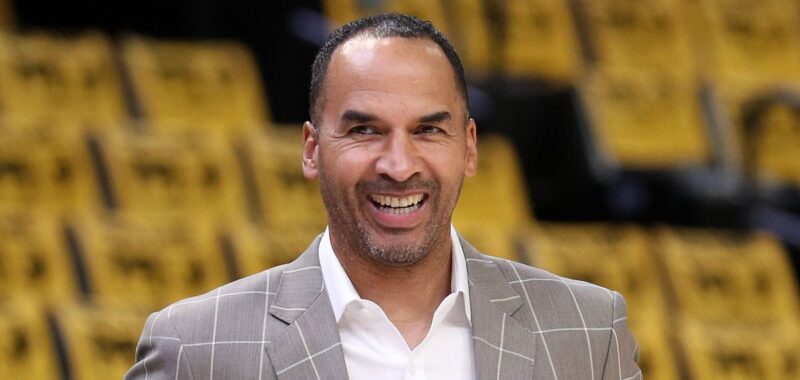The Luka Doncic trade shocked me, but only because I didn’t know Nico Harrison yet.
In his seemingly never-ending effort to explain it, Harrison has given a number of incriminating press conferences. He is totally out of touch, displaying a psychology-textbook-level of cognitive dissonance about how “Kyrie, Klay, PJ, Anthony Davis and Lively… that’s a championship-caliber team.”
But through all the noise and bothersome quotes, reporters are starting to piece together a picture of who Harrison really is. And it’s starting to make all this make sense.
In the latest of several notebook-emptying articles, ESPN’s Tim MacMahon brought us behind the scenes of Harrison vs. his own medical staff, and how he fired longtime Mavericks director of health and performance Casey Smith via video call while he was visiting his sick mother. The revamped staff never gelled with Doncic or his people, and that may have been one of the many reasons Harrison decided to cut bait on the biggest fish he’ll ever see.
But I don’t see it that way. I see a megalomaniac who saw enemies everywhere, one who was so convinced of his own correctness that he built a world where trading Doncic was the right thing to do. And if that’s who Harrison really is — and every quote paints that picture more clearly — he was always going to trade Luka. Because stars are the real power figures in any NBA franchise. And Luka, as a star who Harrison didn’t have a previously collaborative relationship with from his time at Nike, was always going to be a threat to his authority.
Someone didn’t even need to have as much sway as Luka for Harrison to view them as a threat. Take Casey Smith, for example. The longtime trainer was a pillar of the Dallas Mavericks’ organization, which should have made him one of Harrison’s most important allies. Instead, Harrison saw someone with the potential to undercut his decisions and provide an alternate viewpoint, so he removed him. According to one source MacMahon quoted, “He was 100 percent threatened by him.” Another source told ESPN that his firing because he was “too negative.”
Until now, I didn’t have a read on Harrison as a person, since I didn’t know how a real person could make such a boneheaded decision. Where was the dissenting voice? Where was the one guy in the room that said “uh, maybe let’s not trade Luka Doncic”? Where was the logic?
Fundamentally, NBA teams make rational decisions. You can disagree with their reasons, but groups managing billion-dollar enterprises do not simply do things “just because.” Sometimes it’s a massive risk from a team backed into a corner, but it’s never totally inexplicable. That’s why I couldn’t understand this trade, and why so many have turned to conspiracy to explain it.
But it’s becoming increasingly clear that tin foil hats aren’t necessary, and this trade wasn’t done by the organization; it was done by one irrational actor — Harrison — who had become so convinced that he was in charge that he began making irrational decisions to fortify his position.
When Mark Cuban was around, Harrison may have had some oversight. But when the new ownership group came in, it’s possible Harrison painted them a rosy picture of how perfectly he was managing everything and how little help he needed from them. Cuban’s story over the last year-plus since telling the team — from saying he was left in control of basketball operations to not even being told of the Luka trade until after it was too late to stop it because “In Nico We Trust” — certainly indicates as much
And it’s weird to say now, but to be fair to the Mavericks’ new ownership group, the Dumont family, Harrison was legitimately doing a good job; he had the Irving, P.J. Washington and Daniel Gafford trades to point to, as well as the Dereck Lively draft pick. But he seems to have parlayed those successes into removing anyone who could disagree with him.
Perhaps the inner sanctum of Mavericks basketball operations became a sycophantic circle of yes-men, or perhaps Harrison had just created a fantasy world where the opinions of others no longer mattered… or were even in a position to be offered. Whatever the situation, Harrison appears to have been cravenly questing for sole decision-making power, and saw only one person left who could resist him: Doncic himself.
And herein lies Harrison’s greatest crime: not trading Luka, not incessantly trying to defend it, but what led to it all: thinking it was about him, only him, and that removing those that could question his primacy was the only way to survive in one of the most unforgiving professions in the world. That was what destroyed Dallas.
Because it isn’t about Nico Harrison. It’s about the players, Doncic among them. They are the only ones who decide if the Mavericks win or lose, and NBA executives are at their best when everyone forgets about them. There is a reason for their most common job title of GM: they are managers, tasked with putting everyone in a position to succeed and letting them do just that. Once Harrison made the Mavericks about Nico, it was already over.

